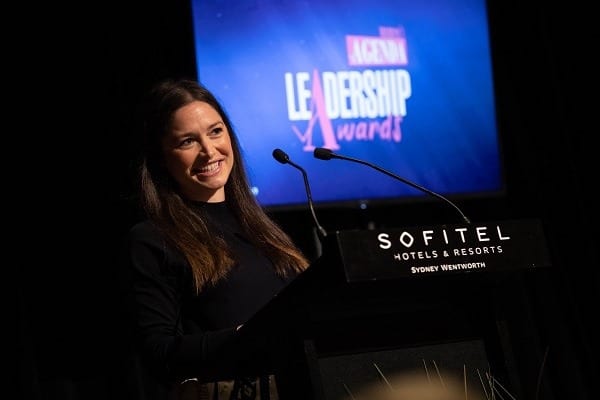“They told me to do whatever you feel you like want to do,” she said. She launched a social media campaign, Dan Come Home, which was the largest of its kind at the time, and amassed a following of 70,000 people on social media.
Loren left her job as an online communications advisor and conducted research without any financial support. Her drive and conviction to provide better support for those affected by missing persons was the catalyst for the Missing Persons Advocacy Network, which O’Keeffe founded in 2013.
Loren remains dedicated – personally and professionally – to the cause of providing support and guidance to the family and friends who have been impacted by a missing person.
For her efforts Loren O’Keeffe, was recognised as an emerging leader in the Not-for-profit category at the 2019 Women’s Agenda Leadership Awards.
An estimated half a million Australians are impacted each year by a missing person. According the AFP, at least 100 people in Australia go missing each day. While most are located quickly, some are not. For each missing person, it’s estimated that about 12 people are affected either emotionally, psychologically or financially.
If you believe hell is a place on earth, then those who have had a loved one go missing have likely spent a long time in its vicinity. The trauma and grief of not knowing the whereabouts or status of someone missing has been described as an obscured state of being. It’s a community issue that has historically been left at the margins.
Those who are left behind are faced with a tortuous ambiguity that many of those affected have said, does not get better over time. “It’s the hope that hurts,” one woman remarked in a NSW Justice Department report.
O’Keeffe says she has never thought of herself as a conventional type of leader. “I work solo, I don’t have staff or a team. I don’t have the elements of a traditional work space, so to be around a group of other professional women who are incredible in what they do was such a thrill. To be recognised as an emerging leader blew me away.”
Last year O’Keeffe was named as one of AMP’s TomorrowMakers and in 2014, won the Vodafone Foundation World of Difference. Two years later, MPAN partnered with Vodafone again to set up the Missing Persons procedure to help family and friends of a customer who is missing manage their account in their absence.
The recognition is a reflection of O’Keeffe’s work at MPAN that has shifted things quickly and effectively.
“We’ve managed to get more people to think of Missing Persons as a more digestible issue. I’m getting recognition from Women’s Agenda, and I won a grant from AMP. It’s this acknowledgement of our work and this issue that is changing things for the better. This topic is finally be recognised to the level that it needs to be.”
A few years ago, in the early stages of MPAN, O’Keeffe told reporters that the goal of her group was to enable families of missing loved ones to implore the public to mobilise. Time is of the essence when it comes to locating a missing person so being able to provide families with resources to help work quickly is critical.
That’s why MPAN’s foundation project was the Missing Persons Guide, described as a “world-first practical guide of what to do when someone goes missing that expedites critical processes, minimising time wastage when efficiency matters most”.
“Having tools to know what to do once someone goes missing, to reach out to the public is critical. That’s what we need to rely on—people power.”
Aside from helping families and friends in practical terms, another of O’Keeffe’s greatest aims is to humanise the missing people. Historically, posters and coverage of the individuals have been reductive, and one dimensional. The state of the person gone missing is usually undiscovered to the public, and, as O’Keeffe said to me, “People go missing for a whole host of reasons”.
But mental health related issues are very common. The AFP notes that research has identified that one of the factors that contributes to the rate of people going missing is the impact of mental health on a person’s ability to cope with life.
O’Keeffe currently works closely with about 60 families and would love to have a team at MPAN to make the organisation more sustainable. But that requires funding.
“Funding has been tricky because there’s no traditional stream or trajectory we can follow,” she says. “We are outside of those conventional groupings; we are a topic that people have people have associated with police and crime. And there is a stigma. We associated it with crime and police. But we want to challenge that stereotype.”
O’Keeffe hopes to partner up with large corporations with the capacity to help create a bigger impact.
According to O’Keeffe, almost 90% of supporters, donors and volunteers in the work of Missing Persons are women.
“There is the issue of compassion, and women are very good at showing compassion. We feel and connect. We have lot of it emotion and we bond over that.”
Professionally as personally, O’Keeffe believes that women know how to connect very well. Fundamentally, however, the issue involves everyone, and everyone should be involved in bringing awareness to this issue.
“Those left behind need support. They need counselling.”
She might not consider herself a traditional ‘leader’ but when you consider the extraordinary work she has done to improve services and guidance for those impacted by missing persons since 2013, it’s impossible to deny she embodies the very best version of leadership. A person who inspires action for the betterment of the world.


